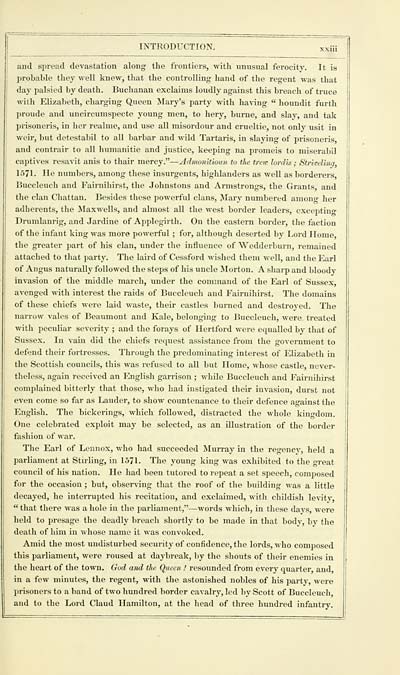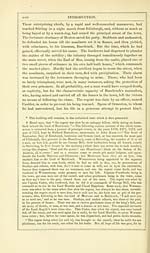Download files
Complete book:
Individual page:
Thumbnail gallery: Grid view | List view

INTRODUCTION.
and spread devastation along the frontiers, with unusual ferocity. It is
probable they well knew, that the controlling hand of the regent was that
day palsied by death. Buchanan exclaims loudly against this breach of truce
with Elizabeth, charging Queen Mary's party with having " houndit furth
proude and uncircumspecte young men, to hery, burne, and slay, and tak
prisoneris, in her realme, and use all misordour and crueltie, not only usit in
weir, but detestabil to all barbar and wild Tartaris, in slaying of prisoneris,
and contrair to all humanitie and justice, keei^ing na promeis to miserabil
captives resavit anis to thair mercy." — Admonltwun to the treir lordis ; ^triveling,
1571. He numbers, among these insurgents, highlanders as well as borderers,
Buccleuch and Fairnihirst, the Johnstons and Armstrongs, the Grants, and
the clan Chattan. Besides these powerful clans, Mary numbered among her
adherents, the INIaxwells, and almost all the west border leaders, excepting
Drumlanrig, and Jardine of Applegirth. On the eastern border, the faction
of the infant king was more powerful ; for, although deserted by Lord Home,
the greater part of his clan, under the influence of Wedderburn, remained
attached to tliat party. The laird of Cessford wished them well, and the Earl
of Angus naturally followed the steps of his uncle JMorton. A sharp and bloody
invasion of the middle march, under the command of the Earl of Sussex,
avenged with interest the raids of Buccleuch and Fairnihirst. The domains
of these chiefs were laid waste, their castles burned and destroyed. The
narrow vales of Beaumont and Kale, belonging to Buccleuch, were, treated
with peculiar severity ; and the forays of Hertford were equalled by that of
Sussex. In vain did the chiefs request assistance from the government to
defend their fortresses. Through the predominating interest of Elizabeth in
the Scottish councils, this was refused to all but Home, whose castle, never-
theless, again received an English garrison ; wliile Buccleuch and Fairnihirst
complained bitterly that those, who had instigated their invasion, durst not
even come so far as Lauder, to show countenance to their defence against the
English. The bickerings, which followed, distracted the whole kingdom.
One celebrated exploit may be selected, as an illustration of the border
fashion of war.
The Earl of Lennox, who had succeeded Murray in the regency, held a
parliament at Stirling, in 1571. The young king was exhibited to the great
council of his nation. He had been tutored to repeat a set speech, composed
for the occasion ; but, obser^^ng that the roof of the building was a little
decayed, he interrupted his recitation, and exclaimed, with childish levity,
" that there was a hole in the parliament," — words which, in these days, were
held to presage the deadly breacli shortly to be made in that body, by the
death of him in whose name it was convoked.
Amid the most undisturbed security of confidence, the lords, who composed
this parliament, were roused at daybreak, by the shouts of their enemies in
the heart of the town. God and the Quceit ! resounded from every quarter, and,
in a few minutes, the regent, with tlie astonished nobles of his party, were
prisoners to a band of two hundred border cavalry, led by Scott of Buccleuch,
and to the Lord Claud Hamilton, at the head of three hundred infantry.
and spread devastation along the frontiers, with unusual ferocity. It is
probable they well knew, that the controlling hand of the regent was that
day palsied by death. Buchanan exclaims loudly against this breach of truce
with Elizabeth, charging Queen Mary's party with having " houndit furth
proude and uncircumspecte young men, to hery, burne, and slay, and tak
prisoneris, in her realme, and use all misordour and crueltie, not only usit in
weir, but detestabil to all barbar and wild Tartaris, in slaying of prisoneris,
and contrair to all humanitie and justice, keei^ing na promeis to miserabil
captives resavit anis to thair mercy." — Admonltwun to the treir lordis ; ^triveling,
1571. He numbers, among these insurgents, highlanders as well as borderers,
Buccleuch and Fairnihirst, the Johnstons and Armstrongs, the Grants, and
the clan Chattan. Besides these powerful clans, Mary numbered among her
adherents, the INIaxwells, and almost all the west border leaders, excepting
Drumlanrig, and Jardine of Applegirth. On the eastern border, the faction
of the infant king was more powerful ; for, although deserted by Lord Home,
the greater part of his clan, under the influence of Wedderburn, remained
attached to tliat party. The laird of Cessford wished them well, and the Earl
of Angus naturally followed the steps of his uncle JMorton. A sharp and bloody
invasion of the middle march, under the command of the Earl of Sussex,
avenged with interest the raids of Buccleuch and Fairnihirst. The domains
of these chiefs were laid waste, their castles burned and destroyed. The
narrow vales of Beaumont and Kale, belonging to Buccleuch, were, treated
with peculiar severity ; and the forays of Hertford were equalled by that of
Sussex. In vain did the chiefs request assistance from the government to
defend their fortresses. Through the predominating interest of Elizabeth in
the Scottish councils, this was refused to all but Home, whose castle, never-
theless, again received an English garrison ; wliile Buccleuch and Fairnihirst
complained bitterly that those, who had instigated their invasion, durst not
even come so far as Lauder, to show countenance to their defence against the
English. The bickerings, which followed, distracted the whole kingdom.
One celebrated exploit may be selected, as an illustration of the border
fashion of war.
The Earl of Lennox, who had succeeded Murray in the regency, held a
parliament at Stirling, in 1571. The young king was exhibited to the great
council of his nation. He had been tutored to repeat a set speech, composed
for the occasion ; but, obser^^ng that the roof of the building was a little
decayed, he interrupted his recitation, and exclaimed, with childish levity,
" that there was a hole in the parliament," — words which, in these days, were
held to presage the deadly breacli shortly to be made in that body, by the
death of him in whose name it was convoked.
Amid the most undisturbed security of confidence, the lords, who composed
this parliament, were roused at daybreak, by the shouts of their enemies in
the heart of the town. God and the Quceit ! resounded from every quarter, and,
in a few minutes, the regent, with tlie astonished nobles of his party, were
prisoners to a band of two hundred border cavalry, led by Scott of Buccleuch,
and to the Lord Claud Hamilton, at the head of three hundred infantry.
Set display mode to: Large image | Transcription
Images and transcriptions on this page, including medium image downloads, may be used under the Creative Commons Attribution 4.0 International Licence unless otherwise stated. ![]()
| Early Gaelic Book Collections > J. F. Campbell Collection > Minstrelsy of the Scottish border > (31) |
|---|
| Permanent URL | https://digital.nls.uk/80600797 |
|---|
| Description | Volumes from a collection of 610 books rich in Highland folklore, Ossianic literature and other Celtic subjects. Many of the books annotated by John Francis Campbell of Islay, who assembled the collection. |
|---|
| Description | Selected items from five 'Special and Named Printed Collections'. Includes books in Gaelic and other Celtic languages, works about the Gaels, their languages, literature, culture and history. |
|---|

